In this edition of the roundup of important court judgments, we look at cases where constitutional courts made important observations about the rights of a married woman, rights of citizens in health issues, and criminal justice administration.
In this edition of the roundup of important court judgments, we look at the case challenging the provisions of compassionate appointment for excluding ‘married daughters’ and a conflict between provisions under Senior Citizens Act, 2007 and Domestic Violence Act, 2005. We will also look at the apex court’s observations on the fundamental right to health and selective media leaks affecting the rights of accused and victims.
Karnataka HC: Excluding Married Daughter from Compassionate Appointment Is Unconstitutional
On 15 December 2020, in the case Bhuvaneshwari V. Puranil vs. the State of Karnataka, the Karnataka High Court held that excluding a married daughter from consideration for appointment on compassionate ground is unconstitutional.
Bhuvaneshwari V. Puranik submitted a representation in November 2016 (re-submitted in May 2017) for grant of appointment on compassionate grounds to the Department of Agriculture Marketing. Her request was denied consideration on the score that she is a “married daughter” based on Rule 2(1) (a)(i), Rule 2(1)(b), and Rule 3(2)(i)(c) of the Karnataka Civil Services (Appointment on Compassionate Grounds) Rules, 1996. The rule declines appointment on compassionate grounds to a daughter who is married and restricts the consideration of appointment to an unmarried daughter only if the widow & son is not eligible for any valid reason or he is not willing to accept the appointment, in case of the deceased male government servant.
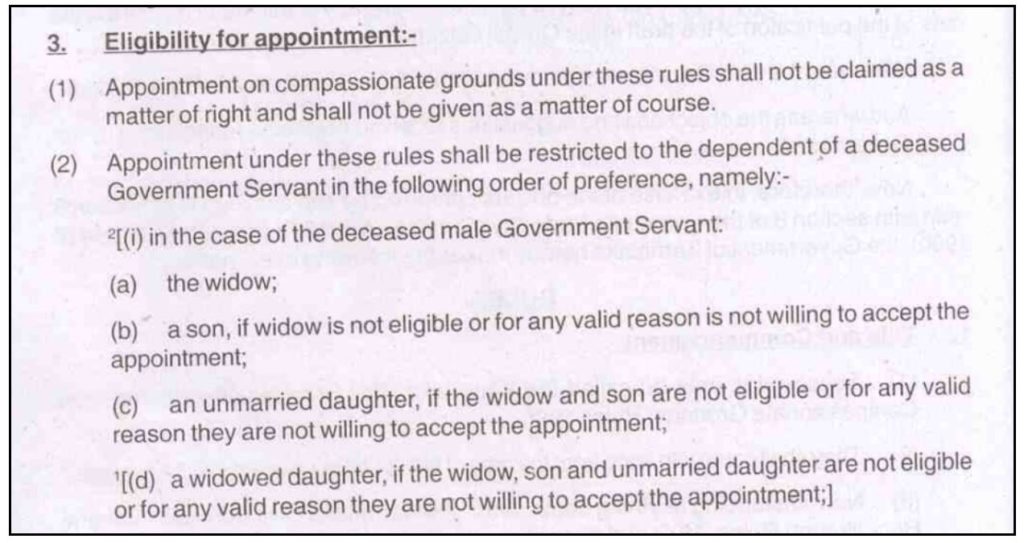
- The court held that the exclusion of married daughters from the ambit of expression ‘family’ in the above-referred Rules is illegal and unconstitutional being violative of Articles 14 and 15 of the Constitution.
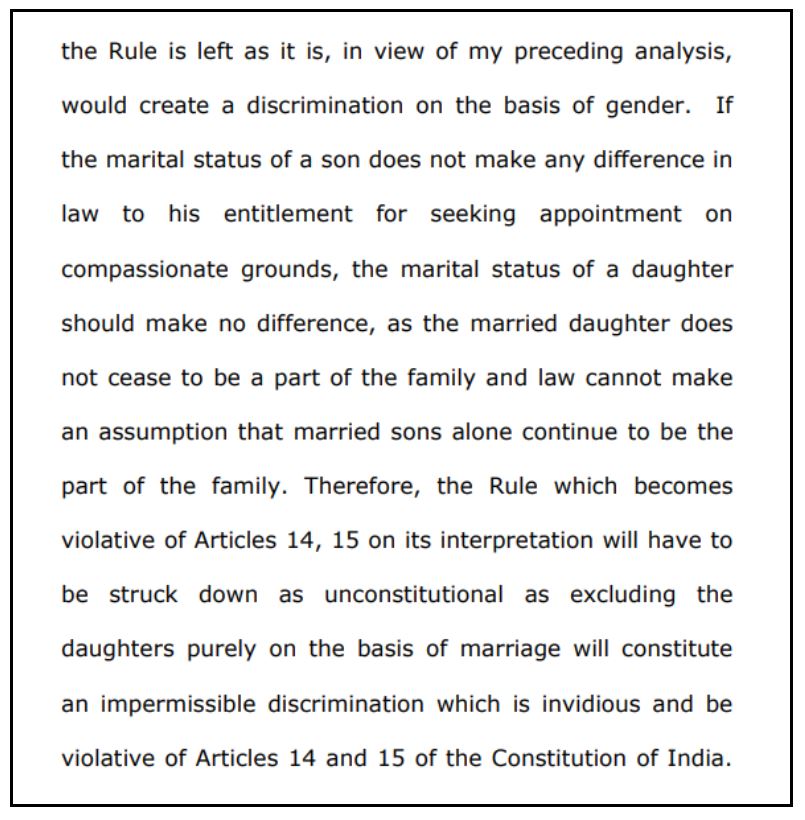
- Accordingly, the judgment strikes down the word “unmarried” in Rule 2(1)(a)(i), Rule 2(1)(b) and Rule 3(2)(i)(c) of the Karnataka Civil Services (Appointment on Compassionate Grounds) Rules, 1996.
- Consequently, it orders the concerned authorities to reconsider the claim of the petitioner for appointment on compassionate grounds and the State Government to pass appropriate orders.
The High Courts of Rajasthan, Uttarakhand, Madhya Pradesh, Chhattisgarh, Himachal Pradesh, Madras, Allahabad, etc have passed similar judgments in the past holding that such exclusion of married daughters is unconstitutional. The Calcutta High Court has held that a divorced daughter would come under the definition of an “unmarried daughter” and would be eligible for appointment on compassionate grounds.
These judgments together set a precedent that the offer of appointment or its denial cannot be based on gender. The above-mentioned provisions in the Karnataka Civil Services (Appointment on Compassionate Grounds) Rules, 1996 create a division of the same object of appointment based on gender by granting an appointment to a son without any qualification and denying the same to a daughter with the qualification of “marriage”.
The judgment also emphasises that marriage does not determine the continuance of the relationship of a child with the parent, whether a son or a daughter. Son continues to be a son both before and after marriage and a daughter also should continue to be a daughter both before and after marriage as marriage does not severe the relationship of the daughter with the parent.
Supreme Court: Selective Leaks to Media during Investigation Affect the Rights of Accused and Victims
In the case of Dr. Naresh Kumar Mangla vs. Anita Agarwal & Ors., the Supreme Court has observed that selective disclosures to the media during the investigation of crime affect the rights of the accused and victims.
The apex court canceled the anticipatory bail granted to four out of five accused in the dowry death case and directed the Central Bureau of Investigation (CBI) for further investigation. A Single Judge Bench of Allahabad High Court had granted bail to the accused observing that that (a) “the FIR prima facie appears to be engineered to implicate the applicants”; (b) “there is no correlation in between the various allegations leveled in the FIR”, and (c) the allegations “are general in nature” with no specific role being assigned to the accused.
The apex court held that there is no cogent basis for the Single Judge to have arrived at any of the three prima facie findings.
Within a couple of days of the death of the victim, the alleged suicide note found its way into the newspapers in Agra. Immediate publicity was given to the alleged suicide note. The Supreme court notes that selective disclosures to the media affect the rights of the accused in some cases and the rights of victims’ families in others. The media does have a legitimate stake in fair reporting. But events such as what has happened in this case show how the selective divulging of information, including the disclosure of material which may eventually form a crucial part of the evidentiary record at the criminal trial.
The court observed that the administration of criminal justice was compromised by the manner in which selective leaks took place in the public realm. In the backdrop of these findings, the court made a strong statement on the role of media and the dangers of dispersing selective information that can influence the procedures of criminal justice administration.
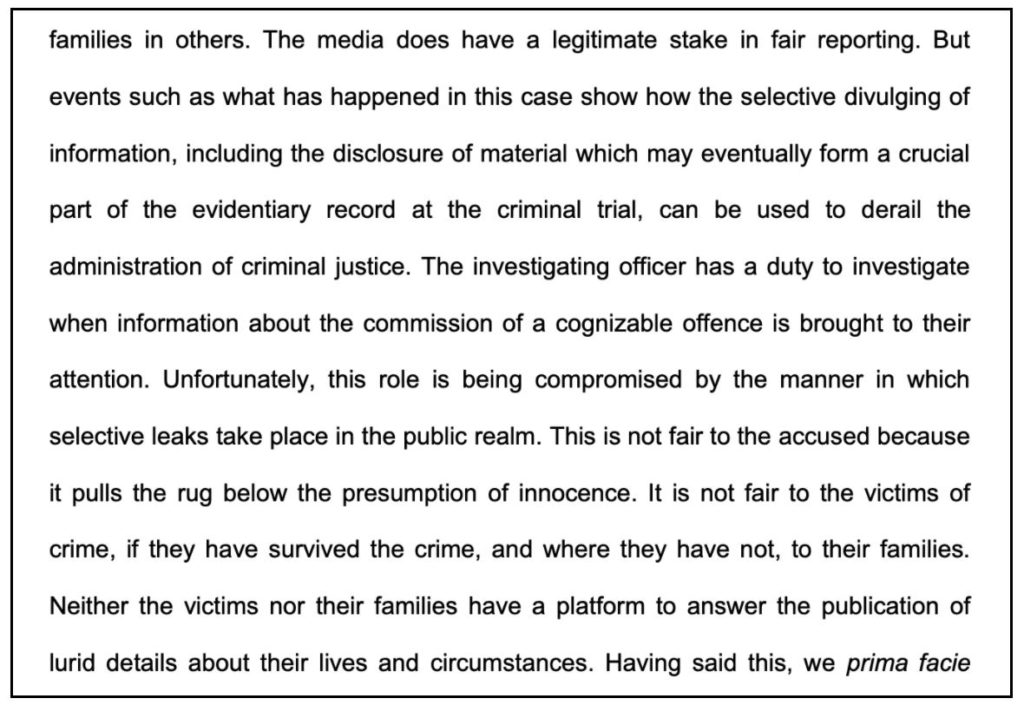
Supreme Court: Fundamental Right to Health Includes Affordable Treatment
In taking suo motu cognizance of fire incident which happened in Rajkot, Gujarat on 26 November 2020 resulting in death of COVID-19 patients in a private COVID Hospital, the Supreme Court issued directives to ensure safety in hospitals and observed that fundamental right to health includes affordable treatment.
The Rajkot incident was the second such tragedy in the state. On 06 August 2020, eight COVID-19 patients succumbed to death in a fire that broke out on the top floor of a four-storey private hospital in Ahmedabad. In both incidents, the fire broke out in the intensive care unit (ICU) ward due to a short-circuit.
The apex court issued the following guidelines regarding fire safety and compliance:
- All States/Union Territories should appoint one nodal officer for each COVID hospital, if not already appointed, for ensuring the compliance of all fire safety measures.
- In each district, State Government should constitute a committee to carry fire audit of each COVID hospital at least once in a month and inform the deficiency to the management of the hospital and report to the Government for taking follow up action.
- The COVID hospitals who have not obtained NOC from fire department of the State should be asked to immediately apply and after carrying necessary inspection, decision shall be taken. Those hospitals who have not renewed their NOC should immediately take steps for renewal. In event, COVID Hospital is found not having NOC or not having obtained renewal, appropriate action be taken by the State.
In cases of non-compliance, the judgement also stressed the need for a helpline number for common citizens to report any non-compliance of safety guidelines or any other guidelines that the concerned state implements.

In taking note of the loss of life and other difficulties caused by the unprecedented COVID-19 pandemic, the court also emphasised that the Right to health is a fundamental right guaranteed under Article 21 of the Constitution of India. Right to health includes affordable treatment. Therefore, it is the duty of the State to make provisions for affordable treatment and more and more provisions in the hospitals to be run by the State and/or local administration are made.
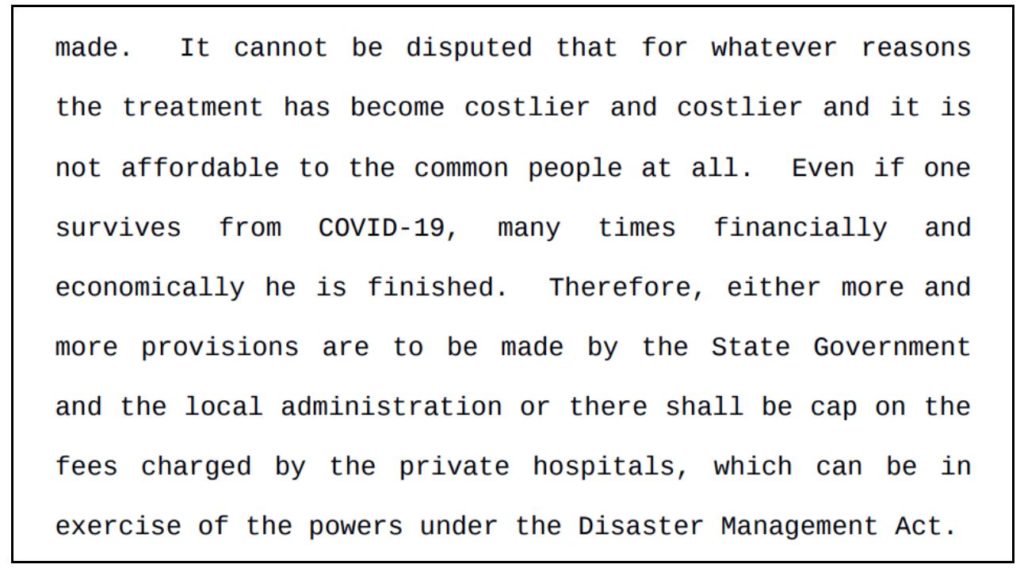
The judgement takes cognizance of public suffering on account of the pandemic and issues guidelines and advisory to the state government on various aspects, including safety of hospitals and affordability of treatment.
Supreme Court: Provisions under Senior Citizens Act, 2007 cannot be deployed to nullify other protections in law, particularly that of a woman’s right to a “shared household” Domestic Violence Act, 2005
In the case S Vanitha vs. Deputy Commissioner, Bengaluru Urban District, the Supreme Court bench was hearing the plea of S Vanitha, residing at her in-law’s residence, challenging the order of eviction passed against her by the Deputy Commissioner. The in-laws filed an application under the provisions of the Maintenance and Welfare of Parents and Senior Citizens Act 2007, and inter alia, sought the appellant and her daughter’s eviction (i.e. their daughter-in-law and grand-daughter) from a residential house in North Bengaluru.
The Division Bench of the High Court by its judgment dated 17 September 2019 held that since the house belonged to the mother-in-law and the daughter-in-law’s right to maintenance and shelter lies only against her estranged husband. The Division Bench upheld the Order of the Deputy Commissioner and directed the appellant to vacate the suit premises.

The appellant, aggrieved by the judgment of the Division Bench, submitted that she is residing in her matrimonial home as the lawfully wedded spouse and she cannot be evicted from her shared household in view of the protection offered by Section 17 of the Protection of Women from Domestic Violence Act (PWDV) 2005.

The Supreme Court outlines that the Tribunal under the Senior Citizens Act 2007 may have the authority to order an eviction, if it is necessary and expedient to ensure the maintenance and protection of the senior citizen or parent. However, this remedy can be granted only after adverting to the competing claims in the dispute. In the present case, it is that the eviction was sought of the daughter-in-law. Although the High Courts have upheld the power of eviction as being implicit in the Senior Citizens Act, that is in the case of sons refusing to maintain their parents. The apex court observes that such facts do not arise in this case.
Section 2(s) of the PWDV Act defines ‘shared household ‘as:
- A household where the person aggrieved lives in a domestic relationship either singly or along with the respondent or
- At any stage has lived in a domestic relationship either singly or along with the respondent.

The judgement observes that in the event of a conflict between special acts, the dominant purpose of both statutes would have to be analysed to ascertain which one should prevail over the other. The primary effort of the interpreter must be to harmonize, not excise.
The court firmly held that Section 3 of the Senior Citizens Act, 2007 cannot be deployed to over-ride and nullify other protections in law, particularly that of a woman’s right to a “shared household” under Section 17 of the PWDV Act 2005.
The judgement broadens the understanding of “shared household” for married women. A “shared household” would have to be interpreted to include the residence where the appellant had been jointly residing with her husband. Merely because the ownership of the property has been subsequently transferred to her in-laws or that her estranged spouse is now residing separately, is no ground to deprive the appellant of the protection that was envisaged under the PWDV Act 2005.
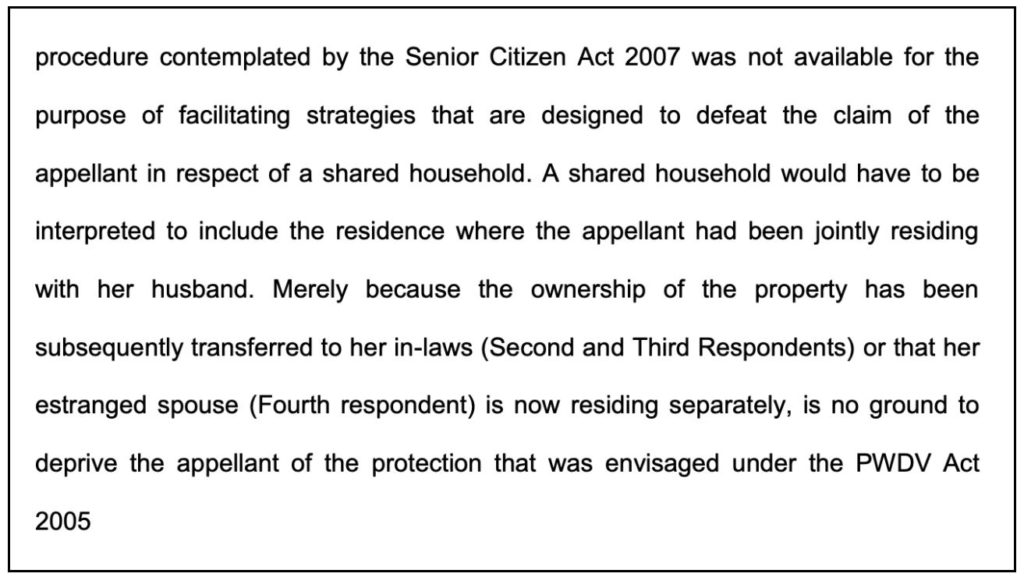
Featured Image: Criminal justice administration


